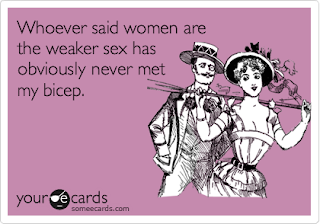 |
| We've come a long way, baby! (At least in terms of clothing and footwear!) |
This way of thinking is short-sighted at best, and dangerous at worst. It becomes dangerous when it's used to justify foreign wars, conflicts, and acts of terrorism. It's short-sighted because it does not take into consideration that there are several different types of strength, an act that reinforces gender stereotypes and establishes very narrow parameters within which to be a woman in modern society.
When strong=best, it follows that stronger=better. Historically, men have placed themselves in a position of power over women because they believed they were stronger than women physically as well as emotionally. From ancient civilizations through the present day, men have justified the subjugation of women because of their perceived weakness. This mentality established a division of the sexes along several lines, many of which are deeply entrenched and pervasiveness that they are commonly accepted as fact.
One of these lines that divides the sexes is in terms of physical strength and the perception of such. Society dictates how women "should" look in order to fit a certain prescribed version of femininity: women shouldn't be too strong, nor should they appear so physically. Women who don't fit this narrow definition are often ridiculed, gawked at, questioned, gossiped about, written about, analyzed, threatened, or worse. Far too often, women in modern society are judged because of how they choose to look, act, and train.
 |
| Amen! |
- Marisa Inda is an accomplished body builder, figure competitor, powerlifter, and overall badass. Her complex and gravity-defying feats of upper-body strength on the pull-up bar caught the attention of the producers of the show Ellen, who had her on as a guest in the fall of 2014. Her body is not considered very feminine by the traditional standards, nor does she train in a manner oft-prescribed for women. She eschews these conventional standards of femininity and shows that there are a whole lot of ways for women to look that are beautiful, sexy and worthy of praise. She is a woman who doesn't apologize for her physique, nor should she: she is a absolute beauty, inside and out.
 |
| Love her! What an inspiration! |
- American Ninja Warrior finalist Kacy Catanzaro, the gymnast and first female to qualify for the finals of the show back in 2014. Kacy came, saw and conquered the course that had formerly humbled many a male contestant. At under 5-feet tall and approximately 100 lbs, Kacy redefines what "strong" looks like. Although she didn't win the ultimate prize, her appearance on a nationally-televised show forced America to challenge conventional notions of female strength and power.
 |
| A whole lotta brawl in a cute, petite package! |
- Women like Jen Sinker of Thrive with Jen Sinker, Jill Coleman of JillFit Physiques, and Neghar Fonooni of Eat, Lift & Be Happy have made it their mission to educate and encourage women so that they can shine bright and be the best versions of themselves. Mindset, movement, and nutrition all play an important role in these women's lifestyle philosophies, all they're all doing their part to help women design the life they love to live and own their strength, inside and out.
 |
| Love these ladies! |
- Communities like Girls Gone Strong and Fonooni's Lean & Lovely Community strive to provide a forum and space on the web where like-minded women can unite under their belief in female empowerment and strength. These communities provide well-curated content on topics ranging from strength training to proper nutrition to mindset and finding balance. These communities make it possible for women to feel supported and encouraged in an environment whose sole purpose is to encourage strong women to forge their own paths to health and wellness.
- In the past couple of years, the number of women who participate and compete in powerlifting and Olympic lifting has grown substantially, thanks in large part to CrossFit. The popularity of CrossFit, the uber-trendy exercise philosophy and competitive fitness sport, attracts women and men alike because it provides a like-minded community of individuals who train together, support each other, and encourage strength gains and feats of athleticism regardless of gender. Apart from CrossFit, more women than ever are using their bodies to make a statement about what is beauty and strength by entering physique, figure, and bodybuilding contests.
In short, these are exciting times to be a woman in strength sports! While there may be a long way to go in terms of shifting the image of femininity in the fitness community, it is a challenge that I--one among many!--take on with pride, determination, and a whole lotta grit!




No comments:
Post a Comment
I'd love to hear your feedback! Thanks for visiting.